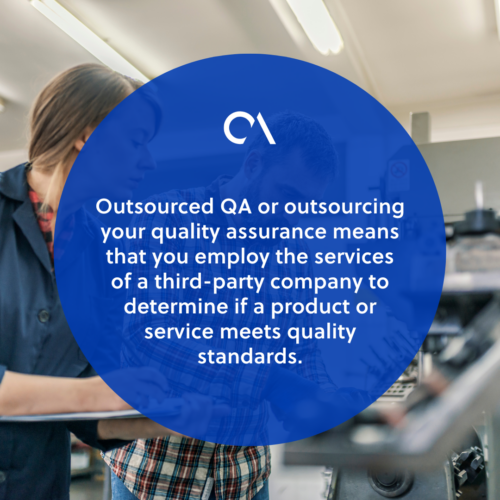Finding the right outsourced QA

Everyone has distinct expectations when it comes to quality assurance, and the testing process helps a company meet the needs and expectations of its customers and stakeholders.
When it comes to software testing, a high-quality service or product is the result of a team effort. In the long run, outsourced services save money and prevent conflicts.
By preventing problems before they arise, you can ensure that quality standards are met and sustained. In today’s business world, quality assurance is a necessity.
What is outsourced QA?
Outsourced QA or outsourcing your quality assurance means that you employ the services of a third-party company to determine if a product or service meets quality standards.
QA outsourcing is a common practice in the software development process, where QA engineers and testers implement various testing methodologies to ensure the product functions as intended.
In other words, the external QA team is responsible for all the testing on your product. They will conduct an audit of your systems, evaluate the product’s current condition, and address any flaws that may exist.
The quality assurance process begins with clearly defined expectations and benchmarks. Errors and confusion are less likely to happen when people know exactly what they are supposed to perform.
While mostly common in the software development industry, businesses of all industries can outsource QA testing services, such as:
- Software testing services
- Software quality
- Manual testing
- Mobile testing services
- Performance testing
- Automated testing
- API testing
- Exploratory testing
- Compatibility testing
- Test execution
- Integration testing
- Test documentation
You can also hire an external team to conduct quality testing. Some of these people include:
- QA experts
- QA engineers
- Test engineers
- QA testers

Outsourced QA vs. In-house QA
Quality assurance is a vital component of the entire process of developing a product and improving customer satisfaction.
In-house QA has its own advantages and disadvantages, but the dynamics are now greatly changing to QA outsourcing.
Many companies now find QA outsourcing as a feasible business solution for numerous operational concerns.
Outsourced QA
Advantages:
- Develop your business faster because you can accomplish more tasks simultaneously.
- If you don’t have enough in-house facilities, your outsourcing QA team can provide all the equipment you need.
- QA outsourcing companies mean no need to hire and train a full-time employee or an internal QA team
- Concentrate on your core strengths when you leave the QA process to an external team of QA experts.
Disadvantages:
- An unreliable QA outsourcing vendor is a waste of time and money.
- It’s impossible to maintain physical control over a testing project when it’s outsourced.
In-house QA
Advantages:
- Confidentiality hazards might be reduced if your personnel is involved in the entire QA process.
- In-house QA improves your company’s QA team by training them.
Disadvantages:
- Training and developing an in-house QA staff requires time and expenses.
- You can’t benefit from economies of scale like a professional QA business can.

How QA outsourcing can help your business
Outsourcing QA can save you a lot of money while ensuring that your company’s product aims for the highest quality possible.
Here are more benefits of outsourcing your QA department and processes:
Outsourced QA is more efficient
QA outsourcing is one of the most cost-effective options for many companies. Outsourced QA can give you superior testing procedures and higher quality assurance.
In fact, companies are more efficient when outsourcing their QA rather than using automated testing. Human testers might have spotted several issues that automation tools miss.
It saves you time and resources
QA outsourcing gives you more time to focus on more important tasks in your organization.
As a result of outsourcing, you don’t have to worry about exhaustive quality assurance evaluation. You are also able to accomplish more tasks simultaneously.
Outsourcing QA testing services helps meet tight deadlines
Expertise and fast workflows are the advantages of outsourcing QA testing services. If you have a tight deadline, you may rely on them to deliver quality testing in a short period.
Outsourcing QA testing allows you to receive results quickly without sacrificing quality by using an external testing provider.
No need to hire full-time QA teams
You can save money by contracting with a quality assurance testing company rather than hiring QA testers.
Although your employees may be experts in their own fields, as the demands of the business grow, you will require the services of other experts as well.

Best practices for outsourced QA
When outsourcing testing services, make sure your service provider uses the latest testing technology and processes.
Hiring a trusted outsourcing company— such as Cloudstaff — to help with the QA process is an excellent option, but there are a few things to keep in mind.
Make a financial plan
When selecting an outsourced QA team, keeping an eye on your budget is essential. One of the best options is to go to a developed country with the most up-to-date technology.
Creating a budget gives you control over your income, expenses, and investments. It also allows you to manage your funds better and reach your financial objectives even when QA outsourcing.
Perform a background check of your outsourced team
Quality assurance is vital for every company. When you are QA outsourcing, you want to work with a reliable and credible firm.
Make sure the individual or firm you’re working with has a good reputation and is trustworthy. If necessary, inquire about references and check out their previous projects.
See how well they performed and what kind of results they achieved.
Assign or hire an expert for communication
Communication with the QA outsourcing firm is simple if your company has a background. You’ll be able to communicate effectively and demonstrate your expertise to the new partners.
However, if you are unfamiliar with the process, it is best to hire a specialist who can communicate with your QA outsourcing partner. You may consider hiring one from Saigon Technology — an outsourcing firm that provides software testing and QA services.
Outsourced QA teams will be impressed by your level of professionalism. Having a specialist helps you communicate more effectively with your business partners.
It will also allow you to comprehend their questions and developments better.
Know your outsourced QA firm’s resources and restrictions
Outsourcing quality assurance will always have its restrictions and limitations. Make sure you know what kind of testing you require before partnering with an outside team.
Choosing the finest QA outsourcing provider will be easier if you are aware of all the resources available to them and the limitations of those resources.







 Independent
Independent




